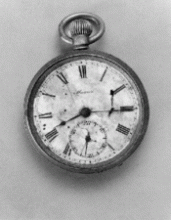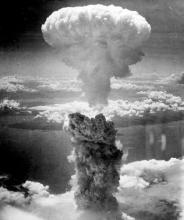On August 6th, 1945, at 08:15, over Hiroshima, Japan, the SuperFortress Enola Gay accompanied by two other B-29 bombers dropped the first atomic bomb to be used as a weapon.
An estimated 80,000 people died almost instantly. At least 50,000 more would die in the days and weeks to follow. Truman told the public that dropping the bomb would save 250,000 American troops, and conveniently did not mention that Japan's emperor had already broached the topic of peace. Both the Roosevelt and Truman administrations invested a great deal of money in the development of an atomic bomb, but no one knew precisely what it would do to human beings at ground zero.
Three days after bombing Hiroshima, we dropped another atomic bomb on Nagasaki.
Germany had already surrendered. World War II was winding down. Critics of the decision to drop the bomb—code-named "Little Boy"—suggest that the Truman administration felt pressured to justify the 2 billion dollars spent to develop the atomic bomb with this very visible and public demonstration before the war was over; a demonstration that, not coincidentally, the Truman administration perhaps believed would serve as a warning of military superiority to the rest of the world, especially Stalin's Russia.
There's frankly a good deal of evidence to support this cynical perspective. As horrible as it sounds, the American decision to vaporize tens of thousands of civilians in two Japanese cities when American Intelligence of the time suggested strongly that Japan was already on the verge of an unconditional surrender, seems to have more to do with the desire to shape the outcome of post-war politics and diplomacy.
The Folly of War, by Donald E. Schmidt, explores the Japanese military situation of the time quite closely, and reports that The Strategic Bombing Survey reported, shortly after the conclusion of WWII, "Based on a detailed investigation of all the facts and supported by the testimony of the surviving Japanese leaders involved, it is the Survey's opinion that certainly prior to 31 December 1945, and in all probability prior to 1 November 1945, Japan would have surrendered even if the atomic bombs had not been dropped, even if Russia had not entered the war, and even if no invasion had been planned or contemplated."
General Dwight D. Eisenhower observed, "The Japanese were ready to surrender & it wasn't necessary to hit them with that awful thing." By August of 1945, the Japanese navy had essentially been destroyed. Over half of Japan's sixty largest cities had been carpet-bombed to rubble. The war in the Pacific theater was effectively over, according to American military intelligence.
Regardless of whether we believe the bombing was justified or unjustified, the nuclear genie was out of the bottle, with Enola Gay's bombing run over Hiroshima. The world has lived beneath the threat of utter nuclear devastation, since.
The Hiroshima Peace Site, homepage of the Hiroshima Peace Memorial Museum, maintains a great many resources and links, for anyone who'd like to research further.

